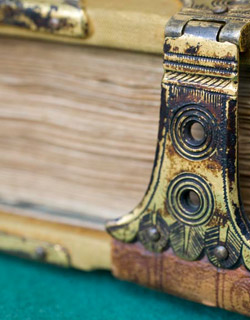// HISTORY

The Ajuda Library, which has occupied its current premises since June 1880, was first created as the successor to the Royal Library, or King’s personal library, whose first collection was organised during the reign of King Dom João I, and was considered to be “numerous and admirable” by the time of King Dom João V.
However, accidents of time and history meant that the Library had to be effectively created anew in the reign of King Dom José I, when it was reconstituted after the 1755 earthquake by purchasing collections belonging to some of the great noble houses.
With the royal family’s departure to Brazil, as Napoleon’s armies invaded Portugal, the Library travelled to Rio de Janeiro, together with the Crown’s collection of manuscripts. However, when King Dom João VI returned to Portugal in 1821, only the latter accompanied him. The approximately 60,000 volumes that remained in Rio de Janeiro later gave rise to what is now the National Library of Brazil.
Whatever act first created the Royal Library, it is entirely lost. Nor do we have any document governing the Library’s operation, other than a set of internal regulations from the 17th century. The Library was again reconstituted by a variety of initiatives undertaken by King Dom João VI and King Dom Miguel, who imposed a legal deposit system in its favour and made it responsible for archive and library functions, which it undertook as a complement to the work of the Royal Press. Until the Proclamation of the Republic, it enjoyed the privileged situation of being administered directly by the Royal Household, subject solely to the monarch’s personal authority and with independence from the government, or Ministry of the Kingdom as the latter was known. The librarians were appointed by the sovereign, often among his personal confidants, such as Alexandre Herculano, Magalhães Coutinho and Ramalho Ortigão.
The Library holdings were gradually enriched by the incorporation of a number of private libraries, other belonging to newly abolished religious orders and, later, by documentation from public bodies, especially the Ministry of the Kingdom.
Private libraries included those of: Dr. Nicolau Francisco Xavier da Silva; the Count of Redondo; Barbosa Machado; José Freire de Monterroio Mascarenhas; João da Mota e Silva, Cardinal da Mota; José Monteiro da Rocha; Pedro de Melo Breyner; the Necessidades Convent, of the Congregation of the Oratory of Saint Philip Nery; the College of Nobles; Bishop Inquisitor Dom José Maria de Melo; King Dom Pedro V; King Dom Luís; and King Dom Carlos. There are also catalogues of other libraries, which leads us to suppose that they were also integrated into the whole. These include the libraries of: Queen Dona Carlota Joaquina de Bourbom; Princess Dona Maria Francisca Benedita; Cândido José Xavier Dias da Silva; the Count of Sampaio; the Count of Vila Flor; the Count of Castro Daire; Dom Luís de Sousa; Francisco Maria Angelleli; Manuel Joaquim de Sá Braga; Dom José da Silva Pessanha; and two Jesuit institutions – the College of Santo Antão and the Professed House of São Roque.



